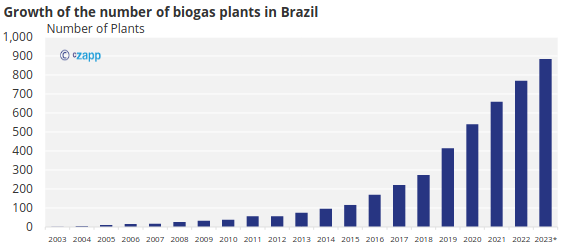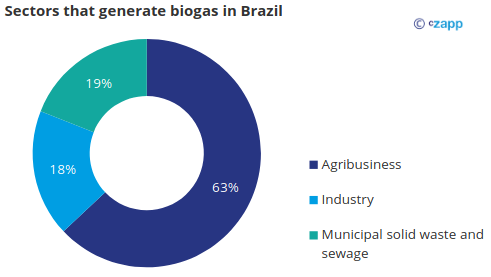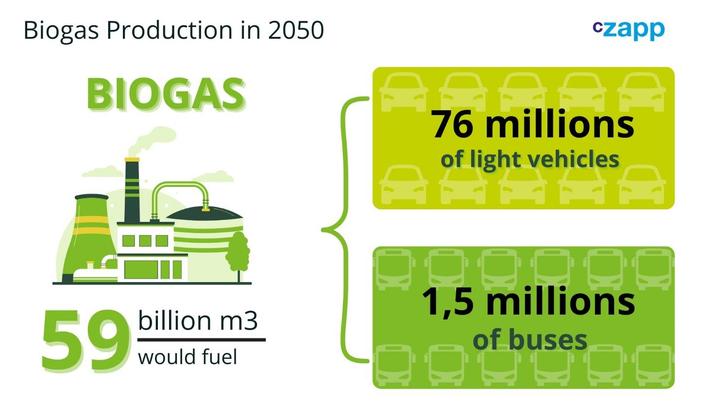Main points
- 111 new biogas plants were opened in Brazil in 2022.
- Further investment into the sector is likely.
- Renewable gas is an alternative to some fossil fuels.
Brazil is a renewable energy powerhouse. More than 80% of its electricity generation comes from renewable sources, and in recent years the country has embraced biogas production. Biogas is made from the decomposition of organic matter by bacteria and is mainly used to generate electricity. Biomass from sugar cane is one of the main sources of biogas in the country, though production is still in its infancy.
Biogas is made in a biodigester, which transforms the organic waste into a gas that is then used in a generator. Biogas’ purest form is biomethane, where other compounds such as carbon dioxide have been removed. Biomethane can substitute some fossil fuels like natural gas.
There are more than 700 biogas units in Brazil. 111 plants opened in 2022 alone. Most of the plants are small. Many are in rural regions, where it is harder to get a constant electricity supply. Together, they produced around 2.3 billion cubic meters, around 10% more than in 2021, although most of the production is still intended for personal consumption.

Source: CBIogás
This year, the market could grow by around 15%, according to projections by CBiogás (International Center for Renewable Energy and Biogas).
Although production is growing, it is still low compared to other countries. Production is much more advanced in European countries and the United States. Seven countries, notably Germany, the United States, China and the United Kingdom, account for around 74% of electricity generation using biogas. In Brazil, electricity generation through biogas reaches just over 420 megawatts per year, representing less than 2% of energy generation, while in Germany it reaches 7,500 megawatts.
The expansion of energy production through biogas in Brazil, however, has been accelerating. Since 2019, it’s grown by around 9.5% per year, according to government data.
Brazil is a world leader in the production of some of the main agricultural commodities, such as soybeans and sugar cane. The country has no shortage of raw materials for generating renewable gas. It is no coincidence that agribusiness has been leading in the production of biogas. In 2022, the sector was responsible for 63% of new plants opened.

Source: CBiogás
Mainly aimed at consumption on the farms themselves, in Brazil, biogas production requires investment in equipment such as biodigesters and electricity generators, which can cost around US$100,000.
For rural producers, the investment pays off due to the use of waste that would otherwise be discarded and the guarantee of permanent electrical energy supply. Furthermore, the largest groups are starting to look at biomethane production. As it can be injected into gas pipelines and sold to industries as a substitute for natural gas or diesel, for the transport sector, it could be a promising market.
By 2029, the country should have an installed capacity of 6 million cubic meters per day, receiving investments of around R$9 billion, according to estimates by Abiogás (Brazilian Biogas Association).
Large companies have been announcing major investments in the sector. In October, the market received news of the inauguration of a plant launched by Jalles and Albioma. Located in Goiás, the plant is expected to generate around 22GW of electrical energy, sold to the National Interconnected System, through the fermentation of vinasse.
“The technology for producing renewable gas is evolving, which should help reduce costs. There is also the environmental and energy transition aspect, into which biogas fits perfectly. Another dimension is the use of vinasse, which is also very interesting”, says Christiano Forman, CEO of Albioma.

In general, interest in the sector has grown among sugar cane mills. São Martinho recently announced the construction of its first biomethane plant, through investments of around R$250 million, in the interior of São Paulo. it should begin operation in 2025.
São Martinho expects to produce around 15 million cubic meters of biomethane each harvest, according to the company, which should be injected into the gas distribution network in the Araraquara region, in the interior of São Paulo.

Market projections indicate that by 2050 total biomethane production in Brazil could reach 59 million cubic meters, especially due to the generation of waste from the agricultural sector in the Southeast and Center-West. It´s enough to power a fleet of tens of millions of cars and 1.5 million buses.
The market, however, is not immune to challenges. One of the main ones concerns costs. Investments to produce biomethane and inject it into the gas pipeline network are still considered expensive. Furthermore, the price of biomethane is still around 65% more expensive than natural gas, as manufacturing processes involve the use of technologies that have not yet reached scale.
In Brazil, most of the gas pipeline network is located close to the coast, near oil and gas extraction sites. The exception is the Brazil-Bolivia gas pipeline, which passes through Mato Grosso do Sul, São Paulo, Paraná and Santa Catarina. It is also worth remembering that the gas pipeline network has not expanded since 2013.
At the same time, biomethane production is concentrated on farms in the interior of the country. It is possible to transport biomethane by truck to gas pipelines, but the market is studying alternatives to reduce this cost.
The sector, however, is paying attention to the potential of biomethane, especially in regions where natural gas has more difficulty reaching. In this sense, the development of new technologies and gains in scale, allowing for cost reduction, are considered of fundamental importance.
The sector is also fighting for tax incentives and solutions such as the creation of logistics corridors in the interior, as well as public policies to encourage the use of biomethane in the oil and gas industry and in the transport sector. If everything goes as expected, the future promises to be promising.







